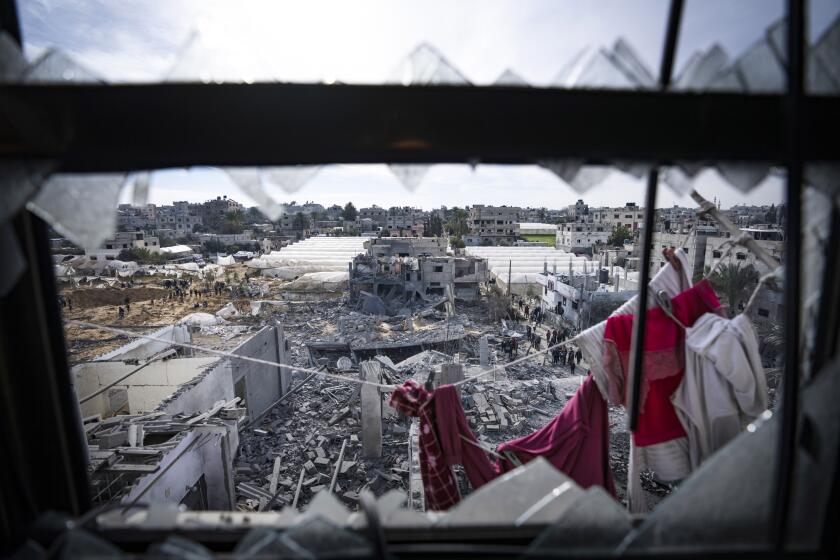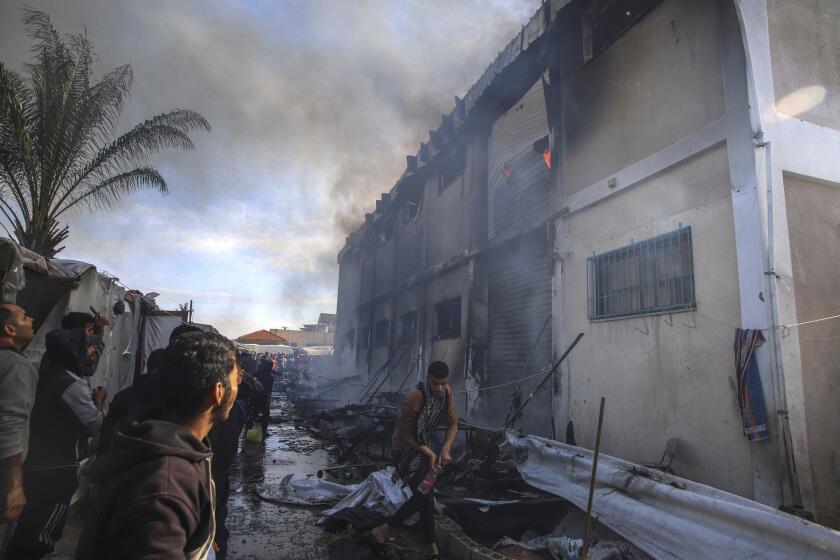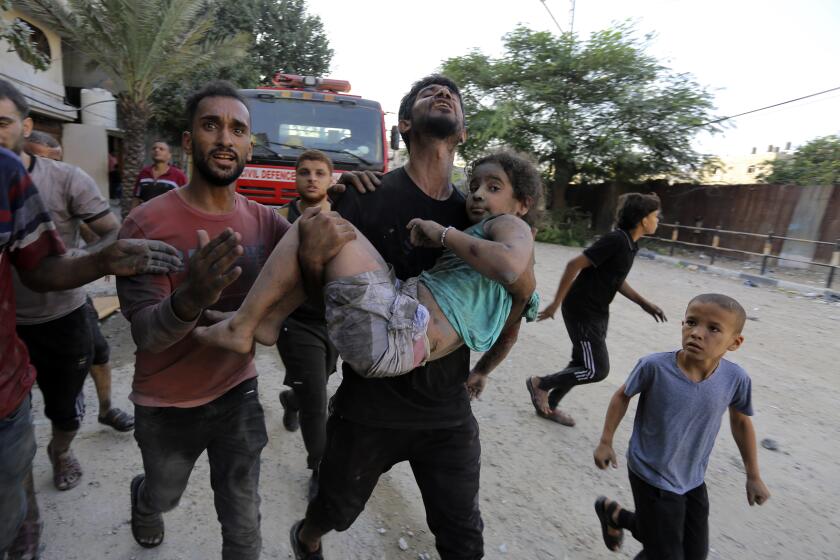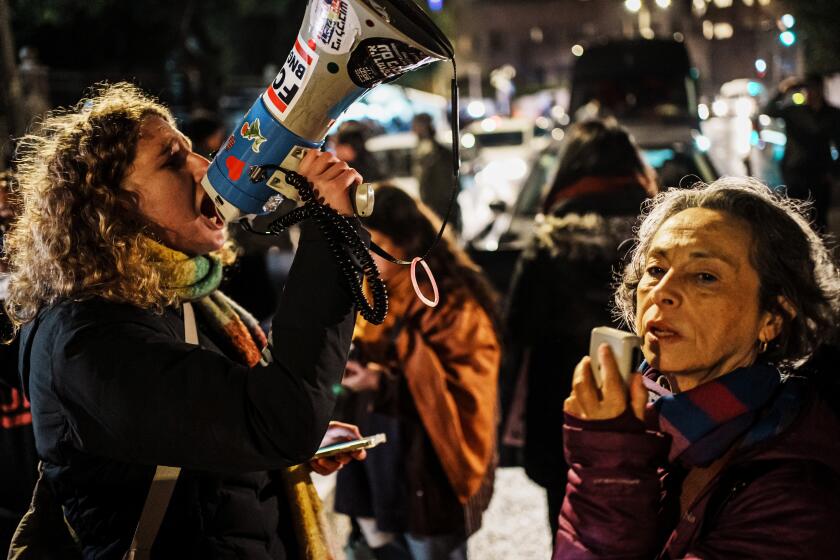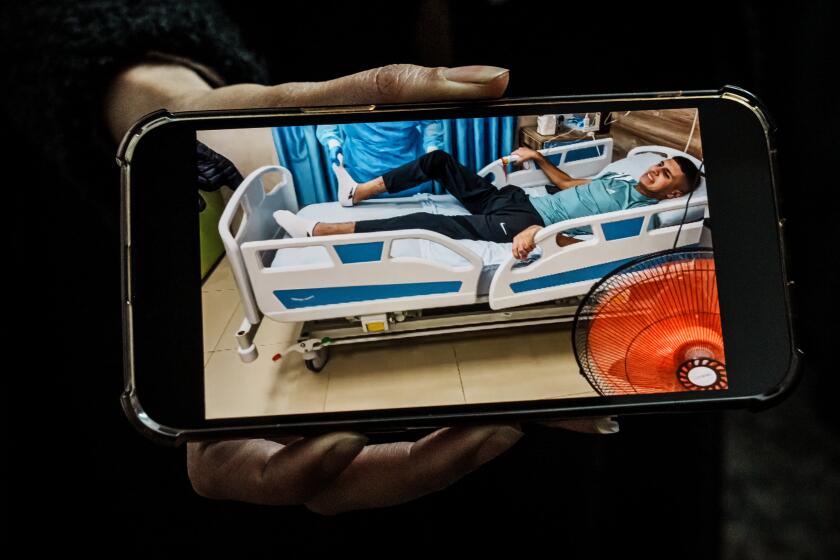Israeli Cabinet set to OK plan for Rafah attack; U.S. strikes Houthi targets in Yemen
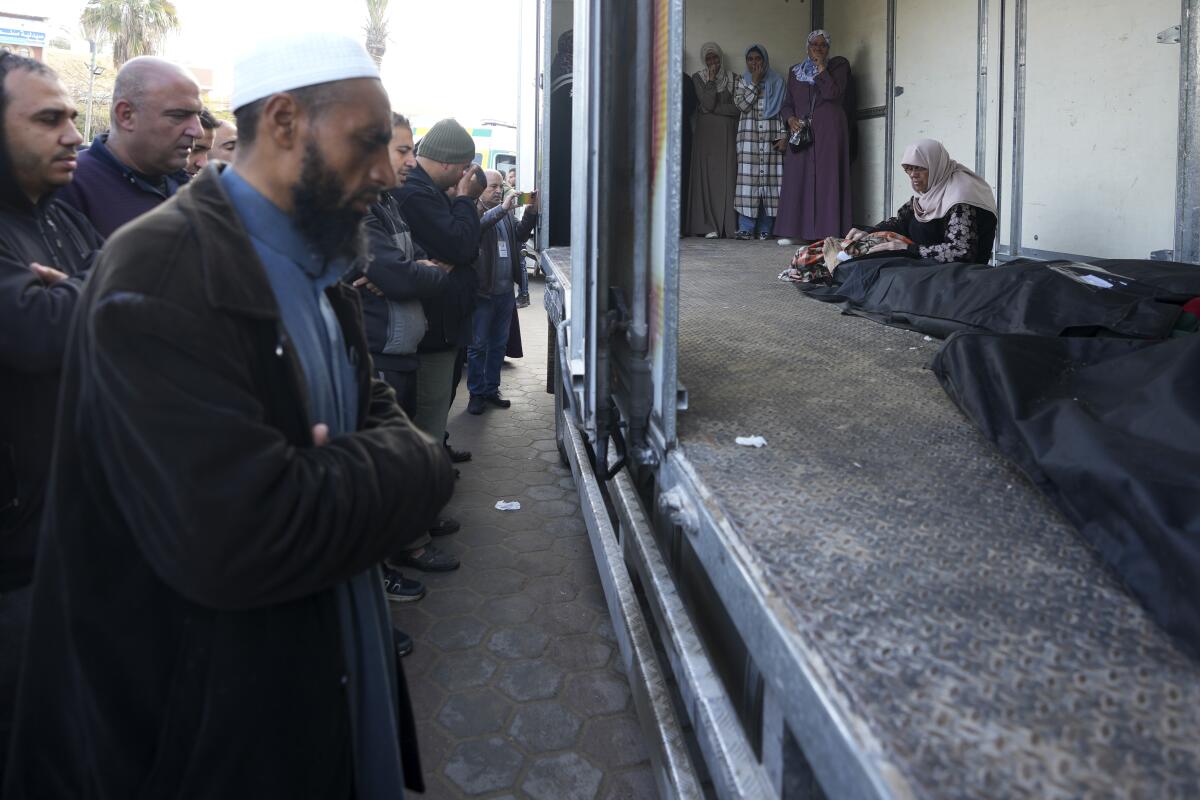
- Share via
DEIR AL BALAH, Gaza Strip — Despite widespread warnings from the international community, Israeli Prime Minister Benjamin Netanyahu plans to convene his Cabinet “to approve the operational plans for action in Rafah,” including the evacuation of civilians from the southern Gaza city.
More than half of Gaza’s population is sheltering in Rafah, and some world leaders have cautioned that an attack there would be catastrophic.
Netanyahu’s statement said that “only a combination of military pressure and firm negotiations” would achieve Israel’s aims in the war. He said Israeli officials would discuss next steps after the latest talks with the United States, Egypt and Qatar in search of a deal on pausing the fighting in Gaza. The countries are serving as mediators between Israel and the Hamas military group.
Meanwhile, the U.S. and Britain on Saturday struck 18 Houthi targets in Yemen, answering a recent surge in attacks on ships in the Red Sea and Gulf of Aden by the militants, who say they are protesting Israel’s attacks in Gaza.
A senior official from Egypt said mediators were waiting for Israel’s official response to a draft deal that includes the release of up to 40 women and older hostages held in Gaza in return for up to 300 Palestinian prisoners held by Israel, mostly women, minors and older people.
Gazans crammed into Rafah along the Egyptian border have no place to escape as Israeli attacks hit ever closer in a final bid to rescue remaining hostages.
The Egyptian official, speaking on condition of anonymity to discuss the negotiations, said the proposed six-week pause in fighting would include allowing hundreds of aid trucks to enter Gaza every day, including in the northern half of the besieged territory. He said both sides agreed to continue negotiations during the pause, in an attempt to secure further releases and a permanent cease-fire.
Negotiators face an unofficial deadline of the start of the Muslim fasting month of Ramadan, around March 10.
Hamas political official Osama Hamdan noted that the group wasn’t at the talks but asserted to reporters Friday in Beirut that Israel had refused its main demands, including stopping the “aggression” and withdrawing from Gaza.
The health ministry in Hamas-ruled Gaza said Saturday that the bodies of 92 Palestinians killed in Israeli bombardments were brought to hospitals over the previous 24 hours, raising the toll from nearly five months of war to 29,606. The number of wounded rose to nearly 70,000. The ministry’s death toll doesn’t distinguish between civilians and combatants, but it has said two-thirds of those killed were children and women.
Israel says its troops have killed more than 10,000 Hamas fighters but hasn’t provided evidence.
An Israeli airstrike hit a house in Rafah, killing at least eight people, including four women and a child, health authorities said. An Associated Press journalist saw the bodies at Abu Youssef al Najjar hospital.
“Enough, enough. Either the Israelis or us should stop. There should be a truce,” said neighbor Abdul-Qader Shubeir, who described feeling lost at not being immediately able to put out a fire burning the bodies.
New genocide allegations
Brazil’s president alleged Saturday that Israel is committing genocide against Palestinians, doubling down after stirring controversy a week ago by comparing Israel’s military offensive in Gaza to the Holocaust, in which 6 million Jews and others were killed during World War II.
Israel has pushed back against genocide claims made at the U.N.’s top court and elsewhere, saying its war targets the militant group Hamas, not the Palestinian people. It says Hamas is responsible for civilian deaths, arguing that the group operates from civilian areas in Gaza.
The International Court of Justice’s ruling comes at an early stage in South Africa’s case alleging that Israel’s actions in Gaza amount to genocide.
“What the Israeli government is doing is not war, it is genocide,” Brazilian President Luiz Inácio Lula da Silva wrote on X. “Children and women are being murdered.”
In response to Lula’s comments, Israel declared him persona non grata, summoned Brazil’s ambassador and demanded an apology. Lula then recalled Brazil’s ambassador to Israel for consultations.
Last month, South Africa filed a landmark case with the International Court of Justice, accusing Israel of genocide against Palestinians. The court issued a preliminary order two weeks later, ordering Israel to do all it can to prevent death, destruction and acts of genocide in Gaza.
Israel, created in part as a refuge for survivors of the Holocaust, has accused South Africa of hypocrisy. South Africa has compared Israel’s treatment of Palestinians in Gaza with the treatment of Black South Africans during apartheid, framing the issues as fundamentally about people oppressed in their homeland.
Civilian deaths in Gaza have fueled global outrage. But many Israelis, still raw from Hamas’ Oct. 7 attack, have scant interest in the war’s toll on Palestinians.
Hunger and diseases spread
Israel declared war after the Oct. 7 Hamas attack in which militants killed about 1,200 people and took around 250 hostages. More than 100 hostages remain in captivity in Gaza.
More than three months into the Israel-Hamas war, the families of hostages held in Gaza have grown disillusioned with Israel’s military operations.
The rising civilian death toll and worsening humanitarian crisis in Gaza have amplified calls for a cease-fire. Hunger is rife, infectious diseases are spreading, and about 80% of Gaza’s 2.3 million people have been displaced, with about 1.4 million crowded into Rafah on the border with Egypt.
“There are choking, skyrocketing prices. It’s terrifying. There is no source of income. The area is very overcrowded,” said Hassan Attwa, a displaced man from Gaza City who is sheltering in a tent on the sand in the southern town of Al-Mawasi. “The garbage, may God bless you, is not collected at all. It stays piled up. It turns into a mess and clay when it rains. The situation is disastrous in every sense of the word.”
Teenage friends Angelina, who is Palestinian, and Adar, who is Jewish Israeli, talk about the Hamas attacks on Israel and Israel’s war on Gaza. ‘It’s OK to disagree.’
In Beit Lahiya in northern Gaza, children banged on pots as part of a protest outside a closed hospital, demanding aid.
Netanyahu has vowed to fight until achieving “total victory” but is under pressure at home. Police used a water cannon to disperse anti-government protesters Saturday night in Tel Aviv, and 18 people were arrested. Others protested in Jerusalem.
U.S., British strikes on Houthi militants in Yemen
According to U.S. officials, American and British fighter jets hit eight locations in Yemen, targeting missiles, launchers, rockets, drones and air-defense systems. The officials spoke on condition of anonymity to provide early details of the ongoing military operation.
This is the fourth time since Jan. 12 that the U.S. and British militaries have conducted a joint operation against the Houthis. But the U.S. has also been carrying out almost daily strikes on Houthi targets, such as incoming missiles and drones aimed at ships, as well as weapons that were prepared to launch.
President Biden and other senior leaders have repeatedly warned that the U.S. won’t tolerate Houthi attacks against commercial shipping. But the counterattacks haven’t appeared to diminish the Houthis’ campaign.
The Houthis have launched at least 57 attacks on commercial and military ships in the the Red Sea and Gulf of Aden since Nov. 19, and the pace has picked up in recent days.
“The United States will not hesitate to take action, as needed, to defend lives and the free flow of commerce in one of the world’s most critical waterways,” said U.S. Defense Secretary Lloyd J. Austin III. “We will continue to make clear to the Houthis that they will bear the consequences if they do not stop their illegal attacks.”
The U.S. F/A-18 fighter jets launched from the USS Dwight D. Eisenhower aircraft carrier in the Red Sea, officials said. The strikes have support from a wider coalition that includes Australia, Bahrain, Canada, Denmark, the Netherlands and New Zealand.
The Houthis denounced the “U.S.-British aggression,” saying in a statement that they would respond “with more qualitative military operations against all hostile targets in the Red and Arabian Seas in defense of our country, our people and our nation.”
Shurafa reported from Deir al Balah and Magdy from Cairo. Julia Frankel in Jerusalem and Lolita C. Baldor and Tara Copp in Washington contributed to this report.
Experts say Israel’s deadly raid on a West Bank hospital may have violated international laws, including a ban on combatants posing as doctors or civilians.
More to Read
Sign up for Essential California
The most important California stories and recommendations in your inbox every morning.
You may occasionally receive promotional content from the Los Angeles Times.
